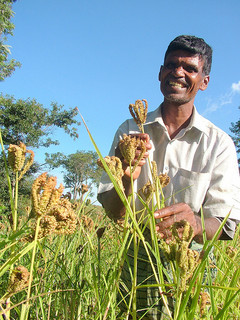By Darryl D’Monte
RIO DE JANEIRO, Jun 22 (TerraViva) “Thousands of farmers are waiting on the side of the road for land reform,” Milton Rondo Filho, Brazil’s minister for international cooperation for tackling hunger, told a meeting organised by Oxfam on “Inequalities and Sustainable Development – a BRICS Perspective” here this week.

Puttaraju, a farmer in southern Karnataka state in India, proudly shows off his prize crop, millet, which assures him of a steady harvest. Credit: Krishna Prasad/IPS
Biraj Patnaik, principal food advisor to the Indian Supreme Court, said that “India and Brazil could learn a lot from other.”
While Brazil had its successful Zero Hunger programme, India had the highest procurement of food grain for public distribution in the world. It also had greater expertise of in-kind transfers of food, and had adopted a rights-based approach to education and employment, while the right to food is being campaigned for.
Brazil has launched what is probably the biggest school feeding programme in the world, involving 47 million children every day, Filho said.
“This forms a virtual cycle, with children in the family and families within the community, if food is procured locally,” he observed.
In 2011, Brazil donated 700,000 tonnes of food grain to needy countries.
Inequality within India has deepened, said Patnaik, who was appointed by the Indian Supreme Court as a food commissioner. “If you leave out Africa, only 16 countries have a lower per capita income. Only five countries have a lower infant mortality.
“The International Food Policy Research Institute, in its World Hunger Report, ranked India 66 out of 88 countries. Mothers have to teach their children how to live with hunger,” he said.
Five hundred million small farmers all over the world – many of them women – provide food for two billion people, almost a third of humanity, Biraj Swain, leader of the Delhi-based Oxfam India Food Justice Campaign, told IPS. One in every five people in the world has no electricity and two out of every five cook on open fires.
The campaign is part of Oxfam’s programme in 40 countries, which seeks to protect small household farmers from the shock of rising prices of food after the financial crisis of 2008.
“For small farmers, it has been Rio minus 20, most retrograde,” Swain said. “There has not been reengagement but reversal. Less than three percent of global food supply can meet the calorie needs of all those who are now deprived of this basic right.”
India is the worst off among BRICS (Brazil, Russia, India, China and South Africa) when it comes to runaway inflation in food prices, she said. “The government is tinkering with fiscal policy, like interest rates. What needs to be done is to bridge the gap between the farm and kitchen.”
Oxfam has put out what it terms “Killer Facts” regarding food security. At one level, economic disparities are great in Brazil, which is three times the size of India, while South Africa is the worst off.
One percent of Brazil’s population owns half the country’s wealth. Globally, the richest one-tenth of people own 57 percent, while the poorest one-fifth have to make do with less than two percent. However, 46 percent of Indian children are undernourished, compared to just four percent in Brazil.
“The lack of access to food in India is the worst in the world, most regressive. As many as seven out of every 10 farmers are net buyers of food. Food and fuel account for 80 percent of their expenditure,” she said.
She cited how her native state of Orissa in eastern India, which has been “bypassed by the Green (agricultural) Revolution”, subsidises electricity for industries while it has the lowest per capita energy consumption in India.
At Rio+20, “food infrastructure” was the most discussed item on the agenda on this sector. However, even if such infrastructure is increased, farmers do not necessarily get food, she said.
What is really required is the guarantee of a support price for farmers’ produce. In the northwestern state of Rajasthan in India, farmers have actually filed a criminal case against the federal government’s Food Corporation of India for neglecting to provide such a support price.
In the central state of Madhya Pradesh, which she describes as “ground zero” for food security in the entire world, the state government has said that it does not have bags to store and transport food grain.
“The government owes the nation the universalisation of food and nutrition rights, as indicated in the agenda of the Indian government’s Integrated Child Development Services scheme,” she said. “More than a Green Revolution, what most states in India require is a Brown Revolution, considering that we are in the semi-arid tropics.”







 Add to Google
Add to Google







